US Says Deal On Iran Releasing Five US Citizens On Track
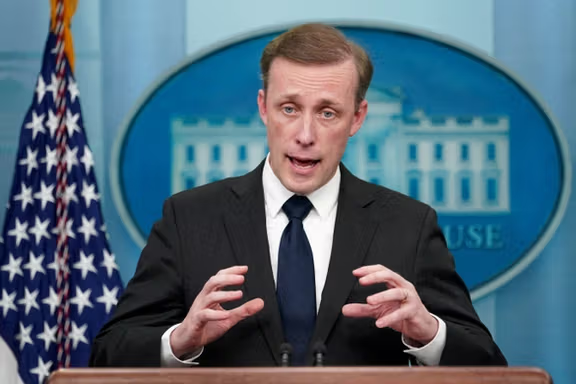
An understanding with Iran to eventually release five Americans remains on track, White House National Security Adviser Jake Sullivan said Tuesday but declined to offer any timeline.

An understanding with Iran to eventually release five Americans remains on track, White House National Security Adviser Jake Sullivan said Tuesday but declined to offer any timeline.
Iran on August 10 released four imprisoned US citizens into house arrest, where they joined a fifth already under home confinement, in the first step of a deal under which $6 billion in Iranian funds in South Korea would be unfrozen and the five would eventually be allowed to leave.
"We believe that things are proceeding according to the understanding that we've reached with Iran. I don't have an exact timetable for you because there's steps that need to yet unfold. But we believe that that remains on track," Sullivan told reporters in a conference call.
South Korean media reported Monday the money has already been transferred to the Swiss central bank that would convert the funds to euros and send it to Iranian bank accounts in Qatar. Iran’s foreign ministry said Monday that it would take two months for the hostages to be allowed to leave.
Allowing the five to leave Iran, which could take weeks, would remove a major irritant between Washington and Tehran, which remain at odds on issues from the Iranian nuclear program to Tehran's support for regional Shi'ite militias.
The Iranian Americans who were allowed to leave Iran's Evin prison included businessmen Siamak Namazi, 51, and Emad Shargi, 58, as well as environmentalist Morad Tahbaz, 67, who also has British nationality. The identity of the fourth US citizen who left the prison has not been made public, nor has that of the fifth who was already under house arrest.

Iran’s exiled Prince Reza Pahlavi has made a public appeal to his compatriots encouraging global support for political prisoners in Iran.
Speaking in front of the US State Department, alongside Darin Dalili and Ghazaleh Sharmahd, children of Shabab Dalili and Jamshid Sharmahd, dual-national prisoners in Iran, Prince Pahlavi said that Iranians, regardless of their global location, remain unwavering in solidarity for their fellow citizens, both within and outside the country.
"We will not remain silent and indifferent to decisions or policies that continue such practices,” he said.
Extending further support to all political prisoners Prince Pahlavi appealed to people worldwide to urge governments not to yield to extortion in exchange for the release of captives. He also criticized the practice of unfair hostage negotiation, stating that the value of all human life is equal. This comment comes after Dalili and Sharmahd were left out of a hostage release deal between Iran and the United States, where over $6 billion blocked funds were released in exchange for American detainees.
Dalili, a former captain of Iran Shipping Company and a US resident, was arrested during a trip to Tehran in 2016 for his father's funeral, after which he was apprehended by security forces.
Jamshid Sharmahd, 67, a former resident of the United States, was abducted by Iranian authorities during a trip from Germany to India in August 2020 during a three-day layover in Dubai.
In addition to suppressing dissidents and detaining political activists and journalists abroad, the Islamic Republic has regularly detained foreign or dual-national citizens as hostages to leverage demands against Western nations.
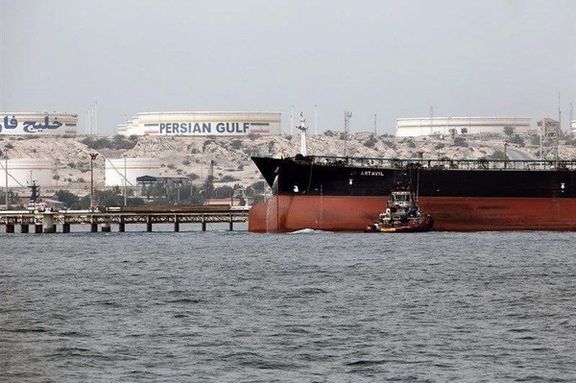
After the US-Iran hostage release deal, a report said Monday that Tehran boosted its oil exports to levels not witnessed since 2017, when there were no sanctions.
TankerTrackers.com that monitors global oil shipments, reported that in the initial 20 days of August, Iran dispatched an average of over two million barrels of oil daily, marking a more than 30-percent surge compared to the past few months.
Bloomberg and others who reported on the development did not offer a specific reason, but except the agreement announced in mid-August that the United States allowed the release of $6 billion of Iran’s money frozen in South Korean banks in exchange for five American hostages, no particular event or decision can be cited.
Iran’s oil exports began to decline in 2018 when former US President Donald Trump withdrew from the JCPOA nuclear accord in May 2018 and imposed third-party sanctions on Iran’s oil exports and international banking. By 2019, Iran was barely shipping 250,000 barrels per day and according to some of its senior officials at the time, it was earning less than $10 billion a year.
Changes started in late 2020 when Joe Biden won the US presidential election. In September of that year, he declared in a CNN op-ed that he aimed to reverse Trump’s decision and resurrect the Iran nuclear deal. China immediately increased Iranian oil purchases, pushing exports to about 700,000 barrels per day by mid-2021. During this period, Tehran engaged in indirect negotiations with Washington concerning the JCPOA, which persisted for 18 months without yielding any results.
After Washington announced last October that it was no longer pursuing the revival of the Obama-era deal, secret talks apparently continued with Iran, eventually resulting in the hostage release agreement. However, numerous media reports have indicated that the deal with Tehran goes far beyond the cash-for-hostages deal and the Biden administration has also agreed not to enforce sanctions in return for Iran slowing down its uranium enrichment.
The news of shipping 2 million barrels of oil per day appears to be the first indication that US oil sanctions on Iran are virtually defunct.
Although Iran is selling the oil with discounts to China and possibly to others now, even a $50/barrel price tag will bring in more than $100 million a day for Iran’s cash-strapped regime.
The only thing standing on the way of a $40 billion annual cash revenue for Tehran now is the US banking sanctions. So far, Iran has been unable to repatriate a significant part of the oil revenues in cash US dollars or other hard currencies. If Chinese and other third-country banks feel the US will look the other way, that restriction will also disappear.
Iran has shown no indication of having changed its anti-West foreign policy, or its malign behavior in the region. As a matter of fact, the United States has beefed up its naval and air power in the Persian Gulf in recent months, concerned that Tehran can continue threatening commercial shipping.
US Republican lawmakers and others who have already voiced serious concern with the hostage deal will see Iran’s oil export data as a vindication of their warnings that President Biden has made a secret deal with Tehran, with no Congressional oversight, as the law requires.
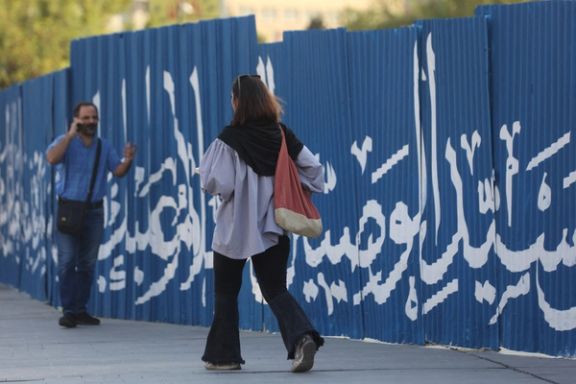
Controversy still surrounds Iran’s new hijab law, with a reformist daily calling it a decision made by 10 parliamentarians for a population of 85 million.
In an article published on Monday, Ham-Mihan newspaper stated, “Only 10 members of the parliament, with a certain political inclination, passed a bill in a week that is expected to impact the lives of 85 million Iranians, including dissidents.”
The paper added that the law will lead to accusations against a significant portion of society over issues related to women's dress code and hijab. Details about the enactment of the new bill are still unknown, as parliament moved earlier in August to make the new hijab regulations even more opaque by approving the regulations without an open session, fearing further backlash.
Iranian lawmakers voted that the bill can be considered under Article 85 of the constitution, which allows the parliament to delegate the bill's approval to an internal committee, effectively sidelining any opposition.
According to Ham-Mihan, the internal committee consists of the same lawmakers who added about 55 articles to the original "Hijab and Chastity" bill, which initially comprised only 15 articles when submitted by the administration of Ebrahim Raisi.
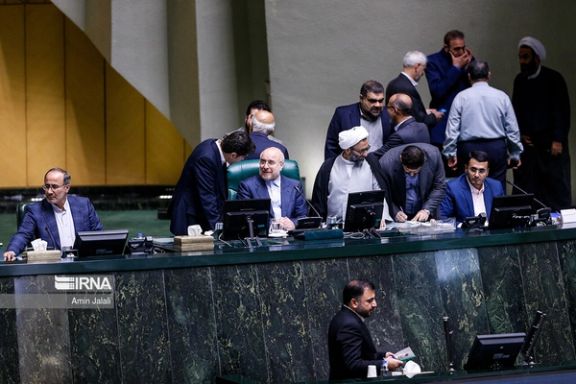
The paper quoted Parliament Speaker Mohammad-Bagher Ghalibaf as saying that discussing a bill with 70 articles in an open session would take a lot of time, especially because about 1,500 points have been suggested by lawmakers to be considered during the discussions. “Some say the parliament is reviewing the bill under Article 85 of the Constitution so that no one understands what is being approved, but this is not true,” Ghalibaf said.
The uprising sparked by the death in police custody of Mahsa Amini in September 2022 has made it increasingly difficult for the clerical regime to enforce the mandatory Islamic dress code. Since the beginning of the ‘Women, Life, Freedom’ movement, tens of thousands of girls and women have shed their compulsory hijab. The regime seeks to criminalize hijab defiance, but no branch of government wants to be solely responsible for the complications of such a provocative and risky action in society.
The fate of the hijab bill, which legal experts claim is against the Iranian Constitution and not practical to implement due to the government's limited means, is still in limbo as conflicting reports circulate about the process. But what is clear is that the government has to devote extensive police and other resources to monitor millions of women, stop those who appear without hijab, issue fines or summon them to court.
This means thousands of confrontations in the streets every day between ordinary women and teenage girls with police and special hijab enforcement agents. It was one such confrontation and arrest that led to Mahsa Amini's death and the most serious antigovernment unrest in 44 years.
Some wonder why the regime has chosen to go the extra mile to force hijab on women, risking another round of protests. Hardliners have answered the question, insisting that the clerical regime cannot retreat from the hijab issue, otherwise it will lose its authority to control the society.
Lawmakers are still voicing opinions and disagreements about how the bill should receive its final seal of approval. Apparently, once the committee approves a bill under the particular constitutional provision, the full chamber has no right to alter it. The Guardian Council, which has the right to review all legislation, will probably review the hijab law too.
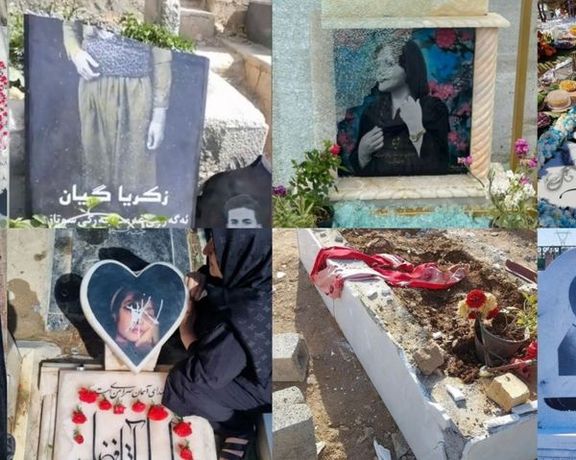
Amnesty International has revealed that the graves of protesters killed during last year’s protests have been vandalized and their families harassed.
The human rights organization's latest research, published Monday, provides concrete evidence of the Iranian authorities' efforts to silence those seeking justice for their loved ones.
The report reveals that graves belonging to more than 20 victims from 17 cities have been vandalized. Graves have been damaged with tar or paint and in some cases set on fire, headstones have been shattered, and inscriptions describing victims as “martyrs” or stating that they died for the cause of freedom have been scraped away. The authorities have also tried to stop victims’ families from holding ceremonies at the graves of their loved ones.
There have not been any official investigations into these acts and in the report, Amnesty International demands immediate action.
"Amnesty International calls on all states to exercise universal jurisdiction and issue arrest warrants for Iranian officials, including those with command responsibility, who are reasonably suspected of criminal responsibility for crimes under international law committed during and in the aftermath of the uprising," urged Diana Eltahawy, Amnesty International’s Deputy Regional Director for the Middle East and North Africa.
Mahsa Amini's family has also faced repeated damage to her grave. The Iranian authorities have announced plans to alter Aichi cemetery in Saqqez, Kurdistan province, where she is buried, limiting public access.
The human rights organization emphasized the international community's responsibility towards protecting the rights of victims' families. These families are subject to arbitrary arrests, unjust prosecutions, coercive interrogations, and unlawful surveillance. The organization demands that the Iranian authorities respect their right to freedom of expression, assembly, and association.
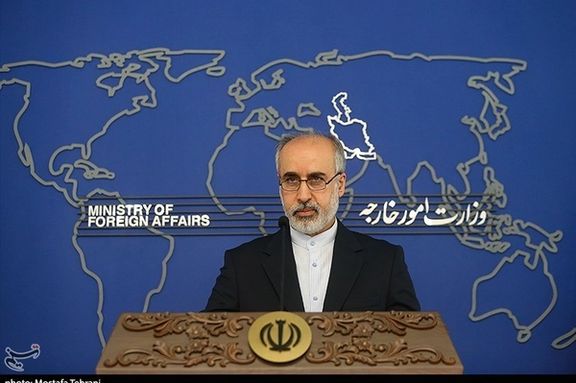
The process of releasing US prisoners held in Iran will take up to two months, Iran's Foreign Ministry Spokesperson Nasser Kanaani said Monday during a press conference.
"A specific time frame has been announced by relevant authorities, and it will take a maximum of two months for this process to take place," Kanaani said.
Earlier this month, Tehran and Washington reached an agreement whereby five US citizens held hostage in Iran would be freed while $6bn of Iranian assets frozen in South Korea would be released.
Iranian assets that had been frozen in South Korea were transferred to Switzerland's central bank last week for exchange and transfer to Iranian bank accounts in Qatar, South Korean media reported on Monday.
The deal foresees the funds remaining in Qatar to be spent on Iranian imports of food, medicine and other “non-sanctionable” goods. The US insists it will have oversight to make sure that the funds are not used for other purposes, however, Iran has said it has full control over the money.
Washington would also release some Iranians from US prisons, Iran said.
Iran allowed four detained US citizens to move into house arrest from Tehran's Evin prison, a lawyer for one said. A fifth was already under home confinement.
The deal has led to criticism in the United States by those who say the $6 billion is essentially a ransom paid for the hostages and it will only encourage Iran and other actors to detain Americans and demand money or concessions. Twenty-six Republican Senators have written to President Joe Biden demanding clarifications. Critics also argue that the money will provide Iran with the ability to spread its terror activities and other malign acts.






